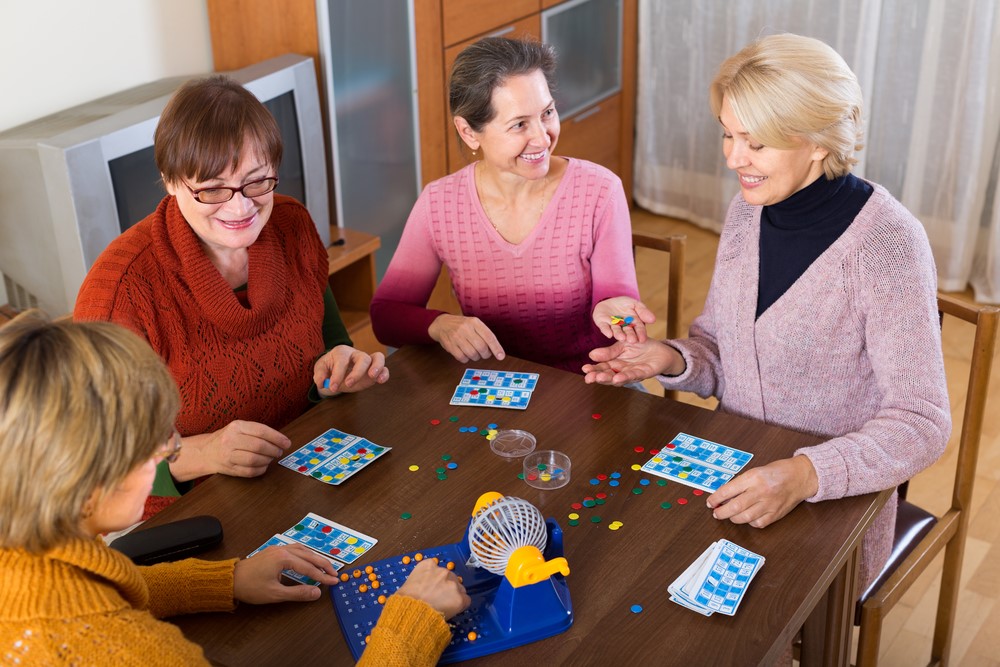
Bingo is famous as a game for the elderly. It’s something that seniors play regularly, while the rest of us normally don’t. After all, it seems like a pretty simple game, one that easily gets boring.
So, what is it that keeps our aging parents coming back to bingo? Why do so many love it, even when they don’t expect to? And, most importantly, what are the benefits of bingo for seniors?
Because, surprising as it may seem, bingo can be very enjoyable. This is even true for seniors who find the game itself pretty simple. Read on to learn more about the different benefits of bingo for seniors, plus how you can make it even more interesting.
It Improves Hand-Eye Coordination
Bingo is a surprisingly fast paced game. Players are competing against each other to fill their cards, so they need to record numbers as quickly as they can.
The fast paced repetitive nature of bingo is powerful for improving hand-eye coordination. This can have many benefits, like reducing mobility issues and promoting energy.
Bingo is excellent in this regard, as seniors can play it while seated. It’s a very accessible game, making it one of the easiest (and most enjoyable) ways to promote hand-eye coordination.
It Promotes Brain Function
Despite being a simple game, bingo can be powerful for the senior’s cognition and brain function.
This is partly because they have to stay alert and respond quickly. Doing so involves keeping their focus on the game and the caller. There’s often a degree of multitasking as well, as bingo is generally highly social, so players will be engaging with each other throughout the process.
Mental challenges like this are fantastic for keeping seniors alert and testing their brain. The practice could even help them to think more clearly. That’s a powerful benefit to get from an enjoyable game.
It Can Improve Mood
Bingo is often incredibly fun. Players are talking and laughing with each other, often as they’re trying to compete.
Many bingo callers play into this too, by using jokes or wordplay as they read out the numbers.
The social connection aspect helps with mood as well. In fact, being lonely and isolated can be very harmful, increasing the risk of many health problems.
In contrast, connecting with people regularly increases stress resilience, helping to make life more enjoyable and perhaps even decreasing pain.
It’s An Easy Form Of Social Connection
While social connection is powerful, it can also be difficult. Some seniors may struggle to make small talk and find questions to ask each other, especially if their days are mostly the same.
Plus, seniors in an assisted living community or visiting a senior center might have little in common beyond their age. Friendships take time to form, which can sometimes make seniors feel even more isolated.
Games like bingo are powerful ways around this problem. Here, social connection is just one aspect of what’s happening. Seniors don’t need to try and have full and detailed conversations. Instead, they can easily laugh and joke with each other, often bouncing off the mood of the room.
It Can Be A Regular Activity
Bingo games are often run weekly, sometimes in senior living facilities, through senior centers, or in other places.
Having games every week or every other week can be fantastic, giving seniors regular social connection to look forward to. This is particularly important for seniors that don’t get out much – as it’s too easy for every day to feel the same.
Promotes Mental And Physical Health
Bingo can actually make people healthier.
This is partly because of the social connection, which helps people to do better and often takes their minds off their own challenges. The cognitive and hand-eye benefits may be relevant too.
Playing games like bingo during hospital stays may even help seniors to recover faster.
Most People Can Play
Another benefit of bingo is that it’s inclusive. The game is easy to pick up, doesn’t require complicated tools, and is already very familiar.
Seniors don’t need to move around either, making it a useful game for anyone in a wheelchair. Even bed-bound seniors could play bingo through a Zoom session or an online bingo game. There are even bingo apps for tablets and smartphones, like Bingo Blitz.
It’s even possible to make simpler versions of bingo, like those with fewer squares and images rather than numbers.
For example, dementia bingo sometimes just involves a card with 9 numbers, that can only include the numbers 1 to 29. This retains the core aspects of the game, while making it easier to play.
There’s also a product called Numbers Bingo. This is designed for kids and people learning English, but it isn’t childish and could easily be used for seniors as well.
Relish has another option – an Animal Audio Bingo Game that has been designed for seniors and even tested with dementia patients. This would be an easy game to play at home too, perhaps just with the senior and their caregiver.
How To Make Bingo More Fun

There are clearly many benefits of bingo for seniors. But, still, the game can get boring and some seniors aren’t at all interested.
If this is the case, why not spice things up? There are plenty of ways to do so.
Try Different Bingo Styles
In the traditional game, players need to make lines on their bingo cards.
This isn’t the only way to do so. You can change the board rules to make things more interesting. For example, the winner could be someone who covers a block of four squares or someone who covers the corners of the board.
Some bingo games avoid using numbers. Instead, they may have pictures or even use the titles of songs. The audio game we talked about earlier is one example of this. S & S Worldwide also offers a Familiar Faces Bingo Game, which has a nostalgic quality as well.
Trivia is another style to play with, where each square may have the answer to a trivia question
The trick here is to match the difficulty to the audience’s ability.
For example, seniors with strong cognitive functions may enjoy a version of the game where they hear the chorus of a song and need to match it to the song title (especially if they can work collaboratively with other players). However, seniors with poor hearing or limited cognitive function might find the style incredibly difficult.
Incorporate Bingo Into A Themed Event
Bingo is a straightforward game, so playing it on its own can quickly get boring.
Why not use bingo as one part of a themed event?
For example, a Christmas event might involve using red and green candy markers on the bingo cards and decorating the room. Seasonal music and related games could bring the whole thing together well – especially with some delicious themed food too.
Era-based games are fun too, like focusing on the 70s or 80s. The bingo caller could get creative too and incorporate plenty of references as they call the numbers.
I’ve even seen risqué bingo events, ones where the caller has great fun with numbers like 69. Such versions work better for a younger crowd. But, the right group of seniors could easily have a blast with it.
Increase The Prizes
Competition is one of the things that makes bingo exciting. The desire to win, to fill the bingo card faster than other players keeps people on the edge of their seats.
Increasing the rewards can make things even more exciting.
Doing so could involve doubling the number of games and rewards. Or, you might make a few games have much more exciting rewards. You could even say that someone who wins a certain number of games gets a particularly rare reward.
Experiment With ‘Play Money’ As Prizes
If you’re playing bingo regularly, the prizes can quickly get boring.
One way around this is to not give out items as prizes. Instead, seniors get a certain amount of play money. This can then be redeemed for the prize they want. Or, you might have a special event where seniors can bid on prizes using the ‘money’ they’ve earned.
This style helps to keep everyone satisfied. It also gives players something to work towards, rather than each bingo game being a stand alone event.
Use Paper And Pens
Bingo is often played using laminated cards and tokens that players place over the numbers. This style is fantastic in senior centers and nursing homes, as everything can be reused.
However, there’s something fun about making things simpler, like using a paper bingo card and ink blot pens. Squashing the pen onto the paper is much more fun than simply placing a token. Seniors could even keep the paper at the end, if they wish to.
Final Thoughts
Bingo has the reputation of being a boring senior game, one that isn’t challenging at all. Yet, there are a surprising number of benefits of bingo for seniors.
The game can even be fast paced and fun, acting as a cognitive challenge and a way to practice hand-eye coordination. The social aspect of the game can’t be ignored either. This is powerful for seniors who spend a lot of time alone.
Plus, bingo is popular. Even seniors who live on their own should be able to find games to attend regularly. Local senior centers will often have games that they can join.
Feeling Overwhelmed?
Check out our Caregiving Consulting service for personalized support and guidance.

Would repeating the bingo call, (for example the leader calls “B2” and the players repeat that call “B2”) improve cognitive function? I want to introduce this idea in my assisted living home. As a special ed teacher I know that using all the senses helps cognition. Saying aloud the call of “B2” uses sound, sight, speech and touch (if a player has that space on his/her card).
There’s certainly the potential for doing so to help – and also no risk of harm.